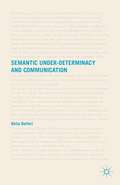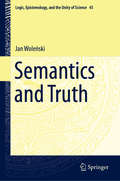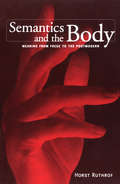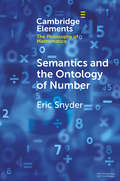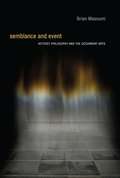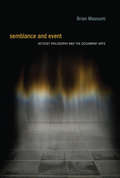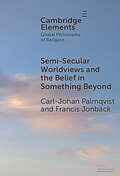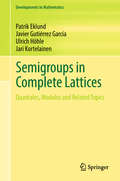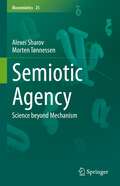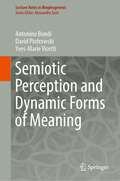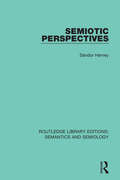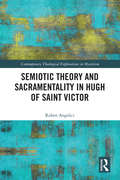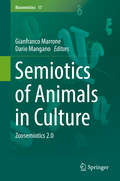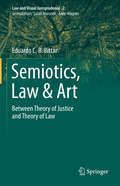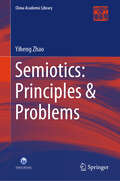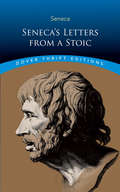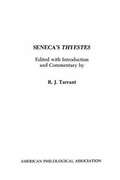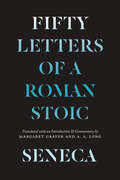- Table View
- List View
Semantic Under-determinacy and Communication
by D. BelleriCombining a fresh, previously unexplored view of the subject with a detailed overview of the past and ongoing philosophical discussion on the matter, this book investigates the phenomenon of semantic under-determinacy by seeking an answer to the questions of how it can be explained, and how communication is possible despite it.
Semantics and Truth (Logic, Epistemology, and the Unity of Science #45)
by Jan WoleńskiThe book provides a historical (with an outline of the history of the concept of truth from antiquity to our time) and systematic exposition of the semantic theory of truth formulated by Alfred Tarski in the 1930s. This theory became famous very soon and inspired logicians and philosophers. It has two different, but interconnected aspects: formal-logical and philosophical. The book deals with both, but it is intended mostly as a philosophical monograph. It explains Tarski’s motivation and presents discussions about his ideas (pro and contra) as well as points out various applications of the semantic theory of truth to philosophical problems (truth-criteria, realism and anti-realism, future contingents or the concept of correspondence between language and reality).
Semantics and the Body: Meaning from Frege to the Postmodern
by Horst RuthrofIn traditional semantics, the human body tends to be ignored in the process of constructing meaning. Horst Ruthrof argues, by contrast, that the body is an integral part of this hermeneutic activity. Strictly language-based theories, and theories which conflate formal and natural languages, run into problems when they describe how we communicate in cultural settings. Semantics and the Body proposes that language is no more than a symbolic grid which does not signify at all unless it is brought to life by non-linguistic signs.Ruthrof reviews and analyses various 'orthodox' theories of meaning, from the views of Gottlob Frege at the beginning of the twentieth century to those of theorists in the postmodern period, then offers an alternative approach of his own. His theory features 'corporeal semantics,' and holds that meaning has ultimately to do with the body and that the meaning of linguistic expressions is indeterminate without the aid of visual, tactile, olfactory, and other bodily signs. This approach also remedies what Ruthrof sees also as a loss of interpretive will in the postmodern era.Pedagogy in many fields could be enriched by a systemic integration of non-verbal semiosis into the linguistically dominated syllabus. Those involved in discourse analysis, literature, art criticism, film theory, pedagogy, and philosophy will find the implications of Ruthrof's study considerable.
Semantics and the Ontology of Number (Elements in the Philosophy of Mathematics)
by Eric SnyderWhat are the meanings of number expressions, and what can they tell us about questions of central importance to the philosophy of mathematics, specifically 'Do numbers exist?' This Element attempts to shed light on this question by outlining a recent debate between substantivalists and adjectivalists regarding the semantic function of number words in numerical statements. After highlighting their motivations and challenges, I develop a comprehensive polymorphic semantics for number expressions. I argue that accounting for the numerous meanings and how they are related leads to a strengthened argument for realism, one which renders familiar forms of nominalism highly implausible.
Semantics, Logics, and Calculi
by Christian W. Probst Chris Hankin René Rydhof HansenThis Festschrift volume is published in honorof Hanne Riis Nielson and Flemming Nielson on the occasion of their 60thbirthdays in 2014 and 2015, respectively. The papers included in this volumedeal with the wide area of calculi, semantics, and analysis. The book features contributions fromcolleagues, who have worked together with Hanne and Flemming through theirscientific life and are dedicated to them and to their work. The papers werepresented at a colloquium at the Technical University of Denmark in January2016.
Semantik und Moralität: Zum Unterschied zwischen dem menschlichen und dem maschinellen epistemischen Zugang zur Welt
by Antonio BikićMuss man eine Situation verstanden haben, um in ihr moralisch handeln zu können? Dieser Frage widmet sich der Autor mit Bezug auf Maschinen, die mit Künstlicher Intelligenz betrieben werden, jedoch die Probleme, die sie lösen, nicht verstehen: Reinforcement-Learning-Agenten. Aktuell werden viele Konzepte im Kontext der Künstlichen Intelligenz genutzt, hinter denen eine lange Entwicklungsgeschichte steht. Diese Konzepte werden zunächst historisch und systematisch aufgearbeitet bzw. eingeordnet. Der Fokus liegt allerdings auf den rezenten Ansätzen zur Umsetzung Künstlicher Intelligenz, insbesondere auf dem subsymbolischen Machine-Learning-Ansatz. Dabei ist die Frage zentral, ob eine Maschine tatsächlich von Normen geleitet werden kann, wenn sie zur Gänze auf Elimination von Bedeutung setzt, um funktionieren zu können.
Semblance and Event
by Brian MassumiEvents are always passing; to experience an event is to experience the passing. But how do we perceive an experience that encompasses the just-was and the is-about-to-be as much as what is actually present? In Semblance and Event, Brian Massumi, drawing on the work of William James, Alfred North Whitehead, Gilles Deleuze, and others, develops the concept of "semblance" as a way to approach this question. It is, he argues, a question of abstraction, not as the opposite of the concrete but as a dimension of it: "lived abstraction. " A semblance is a lived abstraction. Massumi uses the category of the semblance to investigate practices of art that are relational and event-oriented--variously known as interactive art, ephemeral art, performance art, art intervention--which he refers to collectively as the "occurrent arts. " Massumi argues that traditional art practices, including perspective painting, conventionally considered to be object-oriented freeze frames, also organize events of perception, and must be considered occurrent arts in their own way. Each art practice invents its own kinds of relational events of lived abstraction, to produce a signature species of semblance. The artwork's relational engagement, Massumi continues, gives it a political valence just as necessary and immediate as the aesthetic dimension. Massumi investigates occurrent art practices in order to examine, on the broadest level, how the aesthetic and the political are always intertwined in any creative activity.
Semblance and Event: Activist Philosophy and the Occurrent Arts (Technologies of Lived Abstraction)
by Brian MassumiAn investigation of the “occurrent arts” through the concepts of the “semblance” and “lived abstraction.”Events are always passing; to experience an event is to experience the passing. But how do we perceive an experience that encompasses the just-was and the is-about-to-be as much as what is actually present? In Semblance and Event, Brian Massumi, drawing on the work of William James, Alfred North Whitehead, Gilles Deleuze, and others, develops the concept of “semblance” as a way to approach this question. It is, he argues, a question of abstraction, not as the opposite of the concrete but as a dimension of it: “lived abstraction.” A semblance is a lived abstraction. Massumi uses the category of the semblance to investigate practices of art that are relational and event-oriented—variously known as interactive art, ephemeral art, performance art, art intervention—which he refers to collectively as the “occurrent arts.” Each art practice invents its own kinds of relational events of lived abstraction, to produce a signature species of semblance. The artwork's relational engagement, Massumi continues, gives it a political valence just as necessary and immediate as the aesthetic dimension.
Semi-Secular Worldviews and the Belief in Something Beyond (Elements in Global Philosophy of Religion)
by Carl-Johan Palmqvist Francis JonbäckAn increasingly large part of the population in the West identifies as religious Nones. Contrary to what might be assumed, most of them are not outright atheists. They reject traditional religion, but many pursue different forms of spirituality, and many entertain supernatural ideas. This Element concerns the worldview of these 'semi-secular' Nones. When asked about whether they believe in God, they usually provide answers like 'Perhaps not God per se, but I do believe in something'. Belief in 'somethin' is the ontological cornerstone of many Nones' worldviews. The authors reconstruct it as the view 'Somethingism'. They assess Somethingism by inquiring how well it stands up to the epistemic challenge of being true to the demands of reason. They also assess it by exploring how it manages the existential challenge of providing comfort and guidance in this life, and its ability to align us with any transcendent reality there might be.
Semigroups in Complete Lattices: Quantales, Modules and Related Topics (Developments in Mathematics #54)
by Patrik Eklund Javier Gutiérrez García Ulrich Höhle Jari KortelainenThis monograph provides a modern introduction to the theory of quantales. First coined by C.J. Mulvey in 1986, quantales have since developed into a significant topic at the crossroads of algebra and logic, of notable interest to theoretical computer science. This book recasts the subject within the powerful framework of categorical algebra, showcasing its versatility through applications to C*- and MV-algebras, fuzzy sets and automata. With exercises and historical remarks at the end of each chapter, this self-contained book provides readers with a valuable source of references and hints for future research. This book will appeal to researchers across mathematics and computer science with an interest in category theory, lattice theory, and many-valued logic.
Semiotic Agency: Science beyond Mechanism (Biosemiotics #25)
by Alexei Sharov Morten TønnessenThis book invites readers to embark on a journey into the world of agency encompassing humans, other organisms, cells, intracellular molecular agents, colonies, populations, ecological systems, and artificial autonomous systems. We combine mechanistic and non-mechanistic approaches in the analysis of the function and evolution of organisms, their subagents, and multi-organism systems, and in this way offer a theoretical platform for integrating biosemiotics with both natural science and the humanities/social sciences. Agents are autonomous systems that incorporate knowledge on how to make sense of their environment and use it to achieve their goals. The functions of all agents are supported by mechanisms at the lowest level; however, the explanatory power of mechanistic analysis is not sufficient for complex agents. Non-mechanistic methods rely on the goal-directedness of agents whose dynamics follow self-stabilized dynamic attractors. The properties of attractors depend on stable or slowly changing factors, and such dependencies can be interpreted as sign relations if they are adaptive in nature. Agents can replace or redirect mechanisms on demand in order to preserve their functions; for performing higher-level semiotic functions, mechanisms are thus only means. We assume that mechanism and semiosis are not mutually exclusive, and that simple agents can interpret signs mechanistically. This assumption allows us to extend semiotic analysis to all agents, including ribosomes in cells, computers, and robots. This book challenges established traditions in natural science and the humanities/social sciences: semiotics no longer appears as restricted to humans and rational thinking, and biology is no longer limited to rely exclusively on mechanistic reasoning.
Semiotic Perception and Dynamic Forms of Meaning (Lecture Notes in Morphogenesis)
by David Piotrowski Antonino Bondi Yves-Marie VisettiWhat do we mean by semiotic perception? Why should the concepts of perception and expressivity be reinterpreted within the encompassing framework of a dynamic theory of semiotic fields and forms? Can we redeploy the concept of form in such a way as to make explicit such a native solidarity (‘chiasmatic’ would have said Merleau-Ponty) between perception, praxis and expression -- and first and foremost in the activity of language, right to the heart of the life of the social and speaking animal that we are? What then would be the epistemological and ontological consequences, and how might this affect the way we describe semiolinguistic forms? This book aims to provide answers to these questions by opening up avenues of research on how to understand the linguistic and semiotic dimensions at work in the constitution of experience, both individual and collective.
Semiotic Perspectives (Routledge Library Editions: Semantics and Semiology)
by Sándor HerveyFirst published in 1982, this book looks at a wide variety of issues concerning the vast field of study that is ‘semiotics. It begins by tracing the beginnings of modern semiotics in the works two pioneering figures — Saussure and Peirce — in order to present fundamental assumptions, notions and distinctions which provide an essential background to the more recent developments. The author then goes on to look at Behavioural Semiotics, Luis Prieto’s idea of "l’Acte Semique", Austin’s theory of ‘Speech Acts’ and Searle’s elaborations, Barthes’ move away from philosophical and scientific approaches in his ideology of Socio-Cultural Signification, Functionalism and Axiomatic Functionalism, style as a form of communication, semiotics of the cinema, and communicative behaviour in non-human species.
Semiotic Theory and Sacramentality in Hugh of Saint Victor (Contemporary Theological Explorations in Mysticism)
by Ruben AngeliciThis book offers Hugh of Saint Victor’s early scholastic thoughts on sacrament in order to re-discover the pre-modern theological understanding of ontological signification. The Christian understanding of sacrament through the category of ‘signs’ results in a theology that inherently shares in the philosophical notion of semiotics. Yet, through the advent of post-structuralism, current sign-theory is effectively shaped by post-Kantian, ontological foundations. This can lead to misinterpretations of the sacramental theology that predates this intellectual turn. The book works within a context of Christological, realist mysticism. Such an approach allows mutually informing debates in semiotic development and studies on sacramental theology to sit side-by-side. In addition, as a work of ressourcement, influenced by the methodology and concerns of the historical, French Ressourcement, this study seeks to continue an engagement with some of the most promising sacramental positions that have emerged throughout twentieth-century theology, particularly with the revival of interest in Victorine theology. By providing an examination of sacramentality and theories of signification in the early scholastic theology of Hugh of Saint Victor, this book gives fresh impetus to the theology surrounding sacrament. As such, it will be of great interest to scholars of mysticism, theologians of sacrament, philosophical theologians, and philosophers of religion.
Semiotics and Pragmatism: Theoretical Interfaces
by Ivo Assad IbriThis collection of essays brings together a selection of some of the most important studies of Professor Ivo Assad Ibri about the work of Charles Sanders Peirce. In the last decades, Prof. Ibri made important contributions to Peirce studies by showing that the various individual aspects of Peirce’s work actually form a coherent philosophical system, a metaphysical architecture, as he describes it in his previous book Kósmos Noetós (Springer, 2017). Now this new book brings together a selection of 24 articles and book chapters originally published in both Portuguese and English on different topics and aspects of Peirce’s work, such as philosophy of art, heuristic logic, theories of beliefs and habits, objective idealism, pragmatism and pragmaticism. By bringing together this collection of essays in a single publication, Semiotics and Pragmatism: Theoretical Interfaces will be a valuable source for scholars interested in Prof. Ibri’s unique contributions to the study of the philosophy of Charles Sanders Peirce. “In recognizing Ivo Assad Ibri as one the leading exponents of qualitative interpretations of Peirce in the world today, I refer especially to Ibri’s concentration on Peirce’s later-phase metaphysical writings. Ibri’s expertise will be seen to consist in his precise reformulations of Peirce’s full-fledged philosophy, not just pursuing specialized minor topics.” David A. Dilworth Professor of Philosophy, Stonybrook University “Ivo Ibri’s collected essays brims with clarifying insights from beginning to end. He manages to reveal plenty of aspects of Peirce’s thought from angles the traditional scholarship has not been equipped to notice. How not to miss such kairotic theoretical opportunities and how to exploit them to heuristic advantage is a lesson well taught in this outstanding book.” André De Tienne Professor of Philosophy and Director of the Peirce Edition Project, Indiana University
Semiotics of Animals in Culture: Zoosemiotics 2. 0 (Biosemiotics Ser. #17)
by Gianfranco Marrone Dario ManganoTo place animals within the realm of nature, means inserting them among the articulations of culture and the social. Semiotics has never avoided this chiasmus, choosing to deal from the outset with the problem of the languages of animals following the old admonition of Montaigne: it is not that animals do not talk, it is us who do not understand them.Recent research in the field of the anthropology of nature and sociology of sciences and techniques allow to think about the Zoosemiotic issue in a different way. Instead of transplanting the language structures – gestures, LIS, etc. – for a semiotic study of the forms of the human and social meaning, it seems more apt to look at their discourse, and as such, the actual interactions, communicative and scientific as well as practical and functional, between humans and non-humans. This book aims to investigate precisely this hypothesis, known here as Zoosemiotics 2.0, working on several fronts and levels:· Anthropology· Languages of the image and visual representations, from art history to cinema· Old and new media. From literature to comics, from cartoons to TV documentaries but also advertising, music, Web and social networks. All those cultural products that talk about the role of human and non-human in society implicitly proposing (and in some way imposing) a form of articulation of such a relationship.· Food and feeding rites· Animalist, vegetarian and vegan movements · Philosophy: metaphysics, ethics, aesthetics
Semiotics of International Law
by Evandro Menezes de CarvalhoLanguage carries more than meanings; language conveys a means of conceiving the world. In this sense, national legal systems expressed through national languages organize the Law based on their own understanding of reality. International Law becomes, in this context, the meeting point where different legal cultures and different views of world intersect. The diversity of languages and legal systems can enrich the possibilities of understanding and developing international law, but it can also represent an instability and unsafety factor to the international scenario. This multilegal-system and multilingual scenario adds to the complexity of international law and poses new challenges. One of them is legal translation, which is a field of knowledge and professional skill that has not been the subject of theoretical thinking on the part of legal scholars. How to negotiate, draft or interpret an international treaty that mirrors what the parties, - who belong to different legal cultures and who, on many occasions, speak different mother tongues - ,want or wanted to say? By analyzing the decision-making process and the legal discourse adopted by the WTO's Appellate Body, this book highlights the active role of language in diplomatic negotiations and in interpreting international law. In addition, it also shows that the debate on the effectiveness and legitimacy of International Law cannot be separated from the linguistic issue.
Semiotics, Law & Art: Between Theory of Justice and Theory of Law (Law and Visual Jurisprudence #2)
by Eduardo C.B. BittarThis book presents an interdisciplinary study of the relation between semiotics, law & art. Focusing on Greimasian semiotics, it examines specific works of art (from Giotto to Banksy) that deal with the theme of justice, promoting a more sensitive and humanized perception of the values that surround law. The book offers readers a comprehensive review of the semiotics of law, critically examining the relation between law & art. It covers a variety of topics, including semiotics, law and art; semiotics, art and experience; and society, law and art, as well as semiotics, law and painting; semiotics, law and architecture; semiotics, law and theatre; semiotics, law and literature; and semiotics, law and culture. In doing so, it uses the semiotics of painting to explain the symbology of justice and its significance in history; the semiotics of architecture to explain the setting of justice; the semiotics of theatre to explain the logic of the legal process; and the semiotics of literature to explain the narrative logic of legal decisions. Lastly, drawing on the semiotics of culture, it discusses ways of promoting justice, citizenship and human rights. Written from both philosophical and semiotical perspectives, the book enhances the centrality of visual jurisprudence studies to promote a better understanding of the role of law.
Semiotics: Principles & Problems (China Academic Library)
by Yiheng ZhaoThis book attempts to build semiotics on a new foundation, which is “meaning-making”. At the very beginning, the central terms of signs and semiotics are redefined, as the old definition for sign (one thing standing for another) is far from satisfactory. Sign is a perception that is regarded as carrying meaning. In this way, semiotics, now built on the foundation of meaning-making and meaning-cognition, is a science of meaning. All the principles are now under the scrutiny of the new definition, and many issues are answered more succinctly. Therefore, the new definition is extended to the new fields of cultural activities in human society, and a series of problems arise. This book intends to discuss and explore these questions, such as the “middle reclining” in the cultural markedness, the sliding of motivation in art, the difficult distinction between falsehood and untruthfulness, and the driving force of modernization in China.
Seneca Selected Letters (Oxford World's Classics)
by Elaine Fantham Seneca Corporation StaffWe often speak of Seneca as the most distinguished of the many Spanish writers and poets of Rome's imperial age, starting from his own father of the same name, and his nephew Lucan, and including Columella, Martial, and Quintilian. But although all of these writers came from Spain, they were Roman (or Italian) in descent, culture, and tradition. Scipio Africanus had taken eastern and southern Spain from the Carthaginians during the Hannibalic war, and most of the Spanish peninsula had been Roman since the second century BCE.
Seneca's Letters from a Stoic
by Lucius Annaeus Seneca Richard Mott GummereAs chief advisor to the emperor Nero, Lucius Annaeus Seneca was most influential in ancient Rome as a power behind the throne. His lasting fame derives from his writings on Stoic ideology, in which philosophy is a practical form of self-improvement rather than a matter of argument or wordplay. Seneca's letters to a young friend advise action rather than reflection, addressing the issues that confront every generation: how to achieve a good life; how to avoid corruption and self-indulgence; and how to live without fear of death. Written in an intimate, conversational style, the letters reflect the traditional Stoic focus on living in accordance with nature and accepting the world on its own terms. The philosopher emphasizes the Roman values of courage, self-control, and rationality, yet he remains remarkably modern in his tolerant and cosmopolitan attitude. Rich in epigrammatic wit, Seneca's interpretation of Stoicism constitutes a timeless and inspiring declaration of the dignity of the individual mind.
Seneca's Thyestes
by Lucius Annaeus Seneca R. J. TarrantThyestes is widely acknowledged to be one of Seneca's most powerful tragedies. The book provides a modern commentary on the play.
Seneca: Fifty Letters of a Roman Stoic
by Lucius Annaeus SenencaA selection of Seneca’s most significant letters that illuminate his philosophical and personal life. “There is only one course of action that can make you happy. . . . rejoice in what is yours. What is it that is yours? Yourself; the best part of you.” In the year 62, citing health issues, the Roman philosopher Seneca withdrew from public service and devoted his time to writing. His letters from this period offer a window onto his experience as a landowner, a traveler, and a man coping with the onset of old age. They share his ideas on everything from the treatment of enslaved people to the perils of seafaring, and they provide lucid explanations for many key points of Stoic philosophy. This selection of fifty letters brings out the essentials of Seneca’s thought, with much that speaks directly to the modern reader. Above all, they explore the inner life of the individual who proceeds through philosophical inquiry from a state of emotional turmoil to true friendship, self-determination, and personal excellence.
Seneca: Moral and Political Essays
by John M. Cooper Lucius Annaeus Seneca J. F. ProcopéThis volume offers new translations of the most important of Seneca's "Moral Essays": On Anger, On Mercy, On the Private Life, and the first four books of On Favours. They give a full picture of the social and moral outlook of an ancient Stoic thinker. A General Introduction describes Seneca's life and career and explains the fundamental ideas underlying the Stoic moral, social and political philosophy in the essays. Individual introductions, footnotes and biographical notes explain their historical and philosophical contexts.
Senicide and Old Age Killing: An Overdue Discourse (essentials)
by Raimund PoussetRaimund Pousset gives in this essential a concise account of senicide, the modern form of cultural killing of the elderly. He sheds light on both the history and the current situation of an ancient method. Practiced for millennia almost everywhere in the world, this custom of actively disposing of old 'useless' people or passively putting oneself to death is increasingly being revived today. Senicide is a nameless and silent scandal in our modern, enlightened society. The author wishes to bring this silent death into the focus of a mindful professional public, for the segregation of old age and the avalanche of costs in health care suggest that senicide will continue to grow in sad significance
